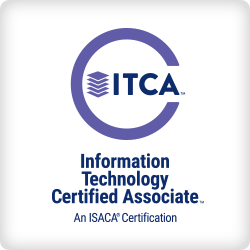Information Technology Certified Associate (ITCA)
CYBERSECURITY FUNDAMENTALS
- Description
- Course Learning Objectives
Course Description
CSX | Cybersecurity Fundamentals Course (4 day)
Why become a cybersecurity professional? The protection of information is a critical function for all enterprises. Cybersecurity is a growing and rapidly changing field that focuses on the protection of information assets that are embedded in internetworked information systems. Given today’s technological advances, professionals who are involved information technologies must be knowledgeable about the central concepts and security implications that frame and define this increasingly all-pervasive field.
The CSX Fundamentals Course is designed to provide an overview of this material, as well as to offer insight into the importance of cybersecurity and the integral role of cybersecurity professionals. This course will also cover four key areas of cybersecurity: 1) cybersecurity architecture principles, 2) security of networks, systems, applications and data, 3) incident response, and 4) the security implications of the adoption of emerging technologies. Designed as a foundational course, it will also prepare learners for the CSX Fundamental Exam.
Pre-Assessment
A pre-assessment provided to attendees will assist the instructor in determining the baseline knowledge of participants, as well as any necessary demographic information. Results from the pre-assessment should be used to help focus lecture and activities to be most meaningful to all participants. The pre-assessment should include questions regarding:
- Level and years of information technology-related experience or other practical experience.
- Knowledge or experience in the area of information security and cybersecurity
- Current title and role
- Domestic or international
- Size and number of employees
- Industry
- Region (US or non-US)
- Educational background
- Degree in cybersecurity or a related field (if so, what)?
- What university did they attend?
WHO SHOULD ATTEND:
Audit, risk, compliance, information security, government and legal professionals with a familiarity of basic information technology and information systems concepts, who are:
- New to cybersecurity
- Interested in entering the field of cybersecurity
- Interested in the ISACA Cybersecurity Certification
- Students and recent graduates interested in the field of cybersecurity
- Individuals with zero to three years cybersecurity experience
- Region (US or non-US)
- Educational background
- Degree in cybersecurity or a related field (if so, what)?
- What university did they attend?
Course Learning Objectives
After completing this course, attendees will be able to:
- Understand basic cybersecurity concepts and definitions
- Understand basic risk management and risk assessment principles relating to cybersecurity threats
- Apply security architecture principles
- Identify components of a security architecture
- Define network security architecture concepts
- Understand malware analysis concepts and methodology
- Recognize the methodologies and techniques for detecting host- and network-based intrusions via intrusion detection technologies
- Identify vulnerability assessment tools, including open source tools and their capabilities
- Understand system hardening
- Understand penetration testing principles, tools and techniques
- Define network systems management principles, models, methods and tools
- Understand remote access technology and systems administration concepts
- Distinguish system and application security threats and vulnerabilities
- Recognize system life cycle management principles, including software security and usability
- Define types of incidents (categories, responses and time lines for responses)
- Outline disaster recovery and business continuity planning
- Understand incident response and handling methodologies
- Understand security event correlation tools, and how different file types can be used for atypical behavior
- Recognize investigative implications of hardware, operating systems and network technologies
- Be aware of the basic concepts, practices, tools, tactics, techniques and procedures for processing digital forensic data
- Identify network traffic analysis methods
- Recognize new and emerging information technology and information security technologies